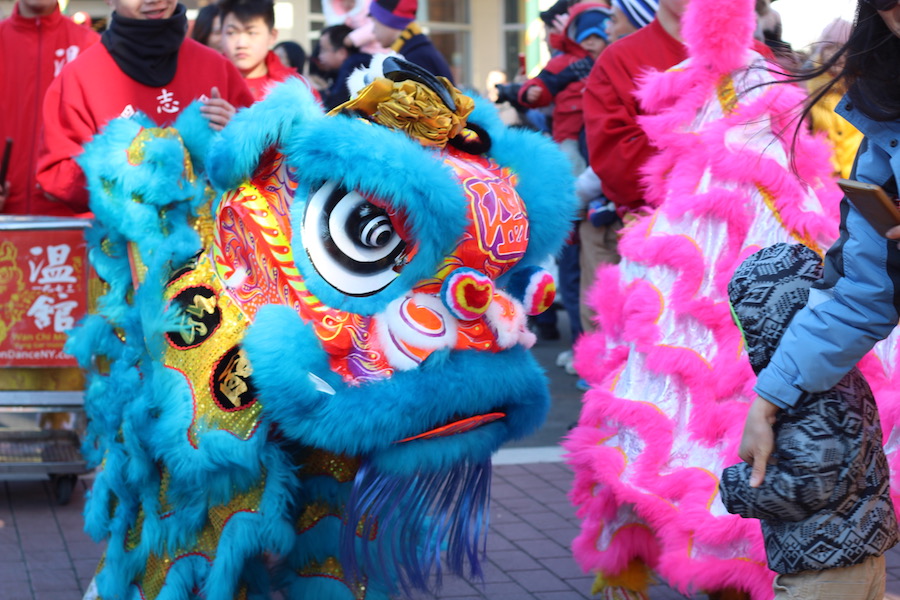
Audubon Arts | Arts, Culture & Community | Lunar New Year

| Lucy Gellman Photos. |
Mai Tran and Hong Newman hadn’t planned on meeting a lion over breakfast Saturday morning. But when one put his long-lashed, furry blue head next to their table, there was only one logical thing to do: reach out their hands, and make an offering.
Tran and Newman were two of thousands to attend Lunarfest 2019, the eighth annual celebration of the Lunar New Year in New Haven. A collaboration among the Yale-China Association, Council on East Asian Studies at Yale, New Haven Museum, City of New Haven and several others, this year’s event rang in the Year Of The Pig with a sharp focus on the greater New Haven community.
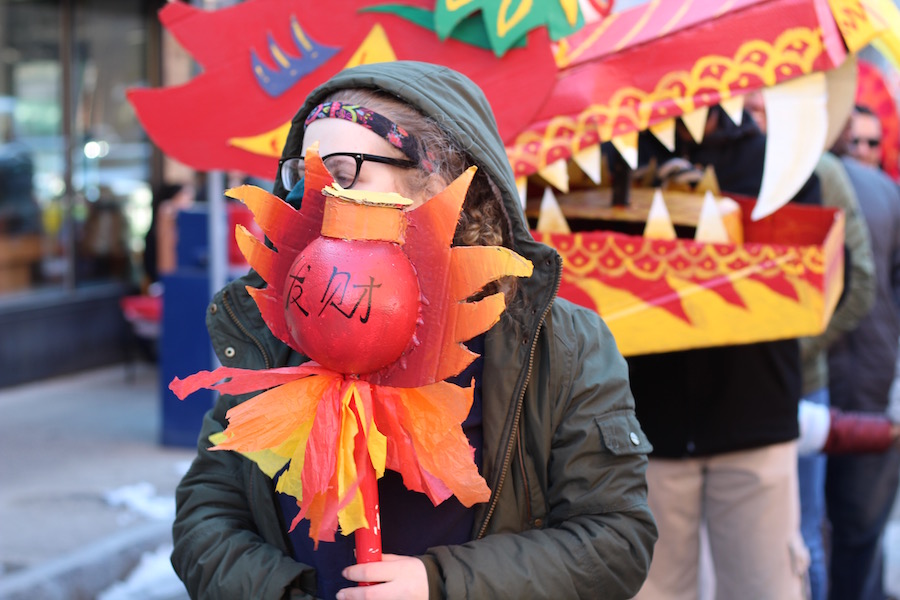
| Educational Center for the Arts student Abigail Rossi. |
This year, funding from both the city’s Neighborhood Cultural Vitality Grant Program and Affinity Federal Credit Union allowed Lunarfest organizers to work with new community partners, holding dragon making workshops with students from Cooperative Arts & Humanities High School, Educational Center for the Arts, ACES Cooperative Center for the Arts and Wintergreen Magnet School, John C. Daniels Interdistrict Magnet School of Communication and the Asian Network at Yale. Organizers also invited members of Southern Connecticut State University’s Blue Steel Drumline, who kept the parade going from the back with a propulsive beat.
“These are both schools with Chinese programs and without Chinese programs, and we thought it was a wonderful opportunity to do something exciting and interesting,” said Annie Lin, arts director at the Yale-China Association. “I’ve always felt that this parade, with only our lions, was missing the dragons!”
“New Haven is multicultural to begin with, and it’s no surprise that there are so many different backgrounds and experiences represented,” she added. “Because this, at the heart of this program, is a community-based program. It’s for the community by the community, and that’s why it looks the way it does.”
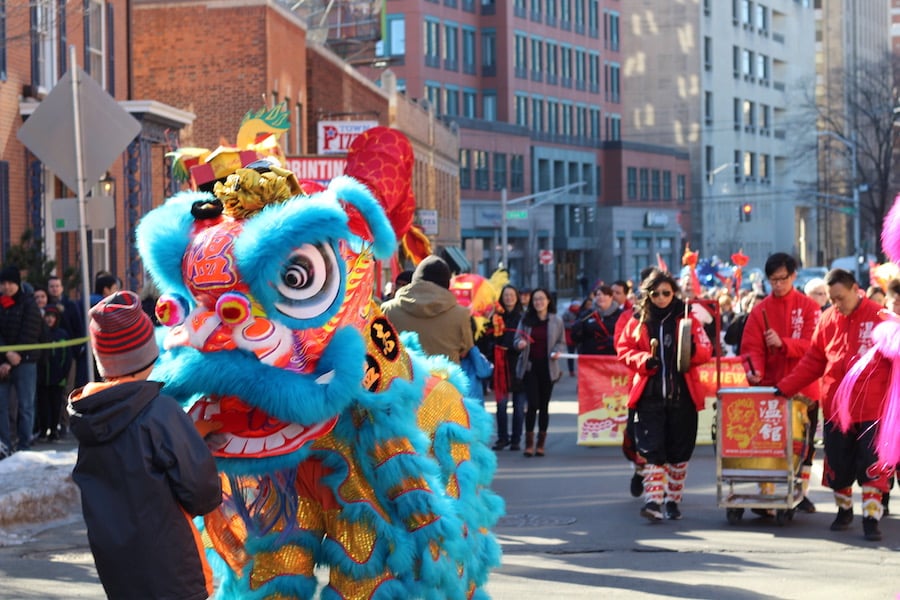 Just past 10 a.m., attendees lined the sides of Whitney Avenue and Audubon Street, waiting for the crashing drum and cymbal from the Wan Chi Ming Hung Gar Institute that would mark the beginning of the parade. With the first thrumming tap tap and clang! a sea of puffy coats, hats and mittens cheered and clapped, kids wandering into the street with the hongbao, or money-filled red envelopes that are customary gifts this time of year.
Just past 10 a.m., attendees lined the sides of Whitney Avenue and Audubon Street, waiting for the crashing drum and cymbal from the Wan Chi Ming Hung Gar Institute that would mark the beginning of the parade. With the first thrumming tap tap and clang! a sea of puffy coats, hats and mittens cheered and clapped, kids wandering into the street with the hongbao, or money-filled red envelopes that are customary gifts this time of year.
At the front of the parade, human-turned-lions Matt Mar and Nicky Ling and Alex Mar and Jian Heng slowed down and sped up cautiously, pausing to blink their huge, melty eyes at anyone who was brave enough to come close. Just a few yards behind them, the festival’s five new dragons bobbed triumphantly, banishing cold. Marchers kept beat with the drums on either end of them, some gripping banners as others waved small lanterns at the crowd, gold tassels dancing in the sunlight.
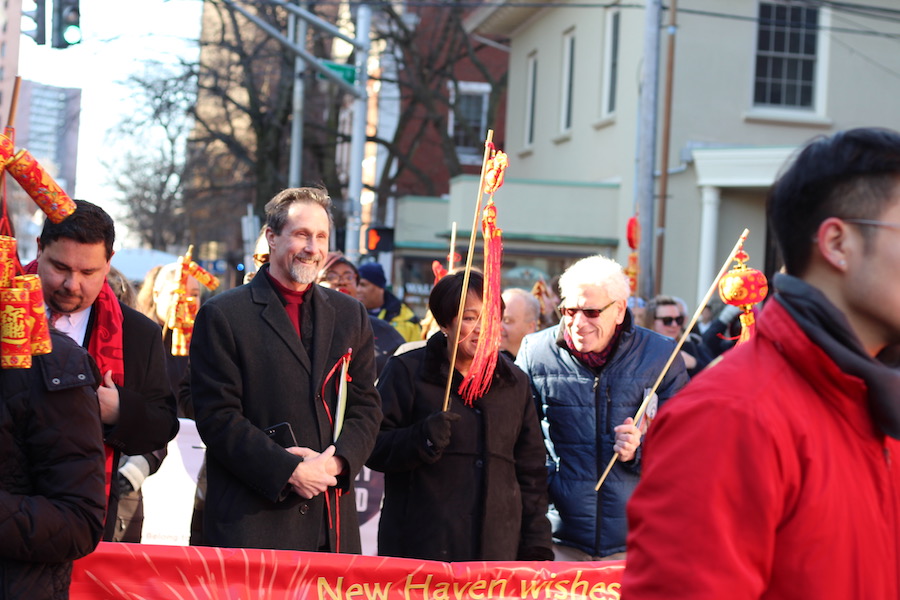
“Gong xi fa cai! Xin nian kuai le,"” crowed David Youtz, executive director of the Yale-China Association, as the parade headed down Audubon Street for a few remarks. Standing on top of a small step to see more of the crowd, he praised this year’s festival for its emphasis on the number eight, particularly lucky in Chinese numerology.
For the first time this year, he said, New Haven can celebrate having eight sister cities, after making the agreement official with Changsha, the capital of Hunan Province, last year. This year’s parade also included eight animals to keep parade-goers engaged during the route. The event had eight venues, spread out across less than a mile of the city. And by pure coincidence, it’s Lunarfest’s eighth year in existence, too.
As Youtz finished, the lions headed to one more stop they had to make before the parade could end—the Chinese-owned businesses that populate Whitney Avenue close to Trumbull Street.
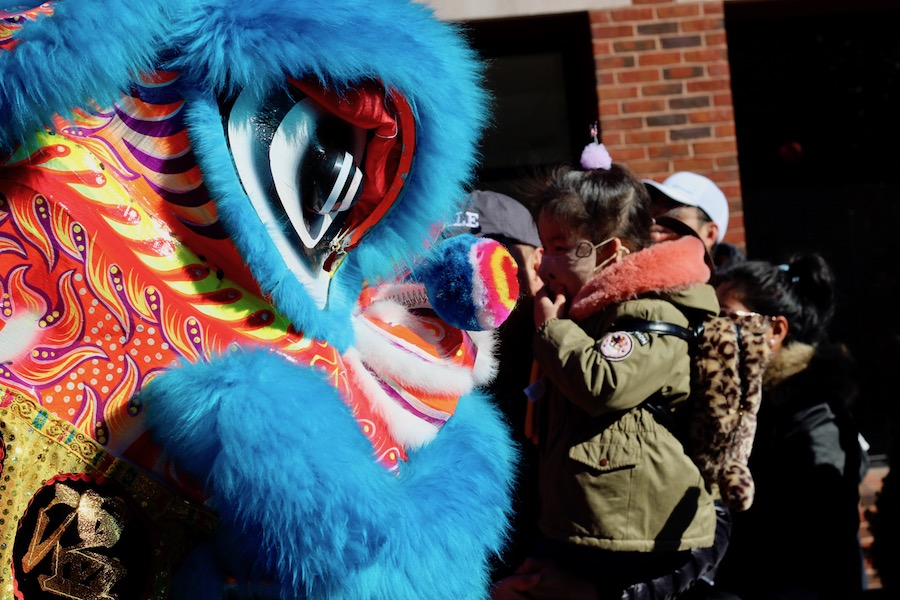
Heading into Hong Kong Grocery, a blue lion bowed and bobbed through the aisles, slowing as a shopper with a stroller perused soba noodle brands. Close to the front of the store, he took a head of lettuce into his mouth and chewed pensively, spitting the leaves back out as a sign of good luck in the New Year. The few parade-goers who had made it into the store, all crowded into a corner, oohed and clapped as the lion headed to the cheering crowd outside.
Just down the block, it shimmied into Great Wall restaurant, owners Peter and Michelle Guo greeting it as delighted diners looked on. Heading past a counter packed with sesame-crusted rice balls and tiny custard tarts, it posted for photos, parading into the restaurant to bless the kitchen and visit with diners.
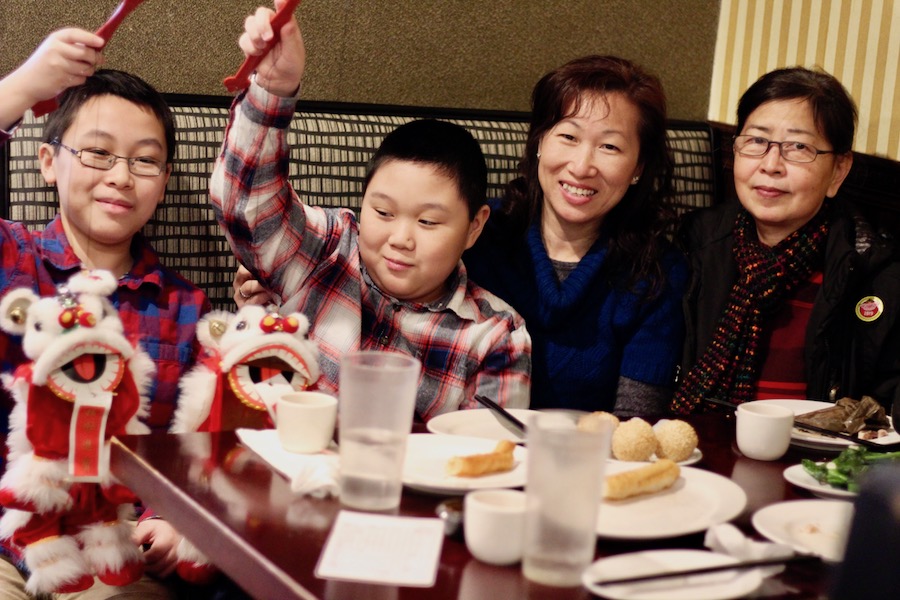
| Brothers Brandon and Brayden Wong, with mom Mai Tran and family friend Hong Newman. |
As it reached the end of the dining room, Tran’s sons Brandon and Brayden Wong waited with tiny lion puppets of their own, dangling them on shimmering red string. On the table, a dish of freshly-sautéed yu choy with thick chunks of meat beckoned. The lion, heading back to the front, went for another head of lettuce instead.
Back outside, the pink lion paced around a tall red pole, beginning to climb as its blue brother joined it again on Whitney Avenue. One last head of lettuce remained at the top. As the lion took it, green leaves rained down on the street. The crowd cheered, a few attendees trying to get some last-minute hongbao to the lions.
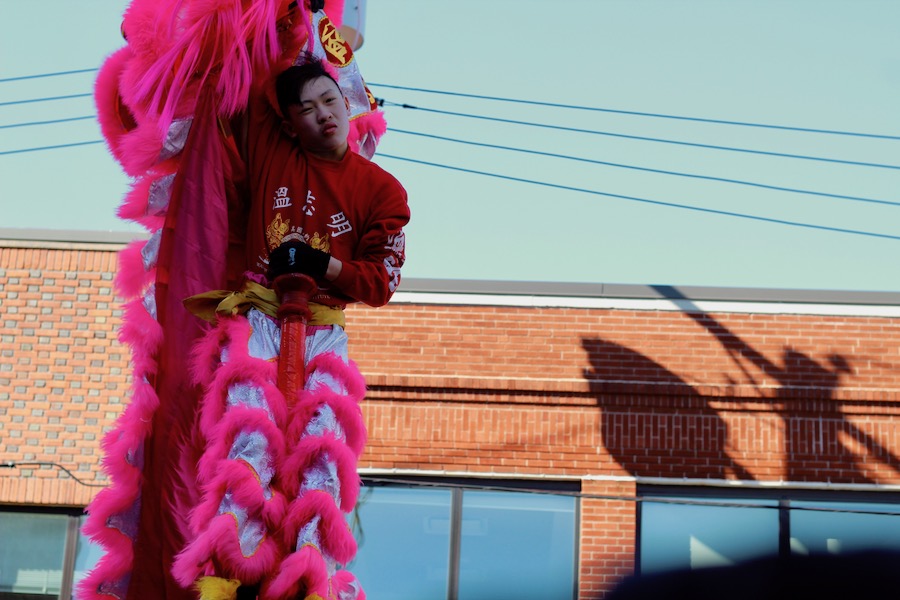
For others, the day’s festivities were just beginning. On the second floor of the New Haven Museum, Lunarfest organizers and volunteers took long bamboo poles, and hit them to the floor in an activity known as Tiao Zhugan, a bamboo pole dance one volunteer called “Chinese double dutch.” As the poles hit the floor, then each other, then the floor again in a syncopated rhythm, attendees jumped into and out of them, making it from one side of the poles to another.
Watching the poles carefully, 15-year-old Ashley Nathaniel jumped in and began hopping. A student at East Hartford High School, Nathaniel said she was drawn to the event because she is studying Mandarin, and travelled to China for the first time last year. After spending time in Beijing, Xi’an, and Shanghai, she said that she’s been looking for events where she can celebrate Chinese culture and practice her language skills. And, it turns out, her Tiao Zhugan technique.
“I just think that it’s an important experience,” she said.
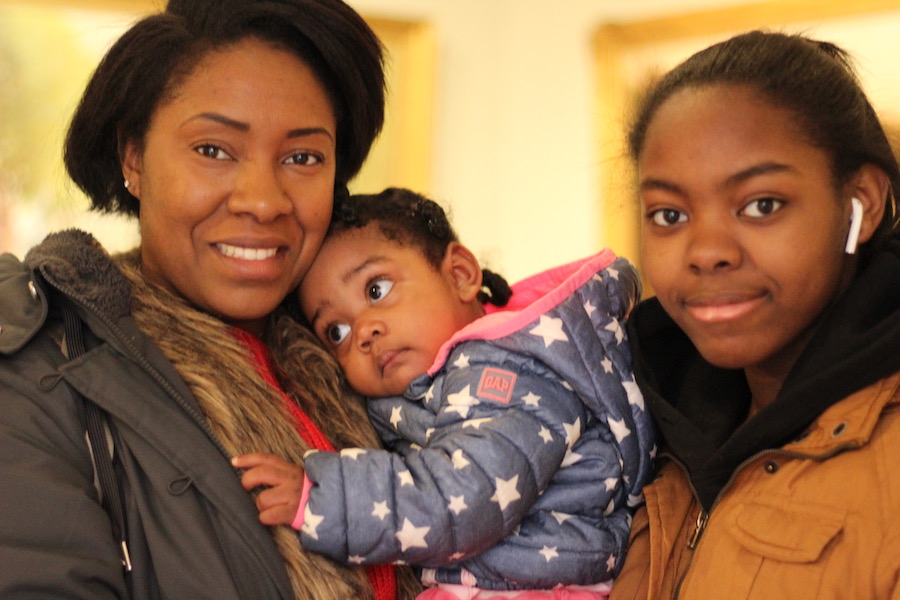
| Camisha McKenzie, 11-month-old Adisyn Laurent, and Ashley Nathaniel. |
One floor down, YUNA exchange student Hayley Wong was teaching Bridgeport transplant Emery Powell to spell his name in Chinese. As she guided him through the motions, inky black letters unfurled across the page, ribbon-like and soft edged next to the English spelling of his name. Initially from New York City—home to a much larger Lunar New Year’s celebration—Emery’s mom Wanda said that she was impressed by the festival’s cultural diversity.
The best part of Lunarfest was “having to translate my name and writing it in Chinese and English,” added Emery, a 7-year-old student at Troup School. “It shows me that I really can do stuff that I haven’t done before.”
Down the street at the Yale-China Association, New Havener Seth Poole took the festival as a chance to record his own story, recounting how a childhood interest in China led him to study Chinese history and culture and Trinity College, and to visit China himself. As he spoke, Lunarfest volunteer Meibin Chen held an iPad that captured Poole’s every word. The project will be part of an upcoming exhibition at the association’s Temple Street digs.
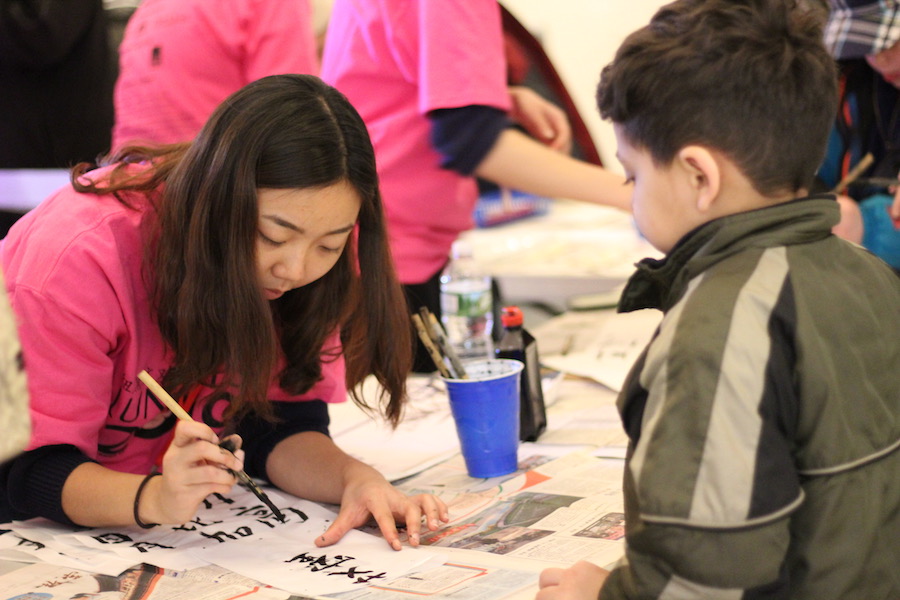
Growing up in New Haven, Poole told Chen, his first entry point into Chinese culture was martial arts movies. On the television and in the movie theater, he saw what he thought was Chinese culture—chopping the air and taking down villains with swift, kick moves.
“I thought Chinese people were superheroes,” he recalled.
But then he became curious about the country. When he was still in elementary school, he started reading books on China at the public library, where he realized the country was much more complex than kung fu fighting. By the time he got to high school, his attention was glued to China’s economy, which he’d learned was the fastest in the world. In college, he majored in International Studies with a concentration in Asia. After learning Mandarin and visiting China—”I want to do it again, but not in July,” he joked of climbing the Great Wall—he said that he still uses Mandarin with his young daughter.
“I’m really getting into this sense of renewal,” he said.
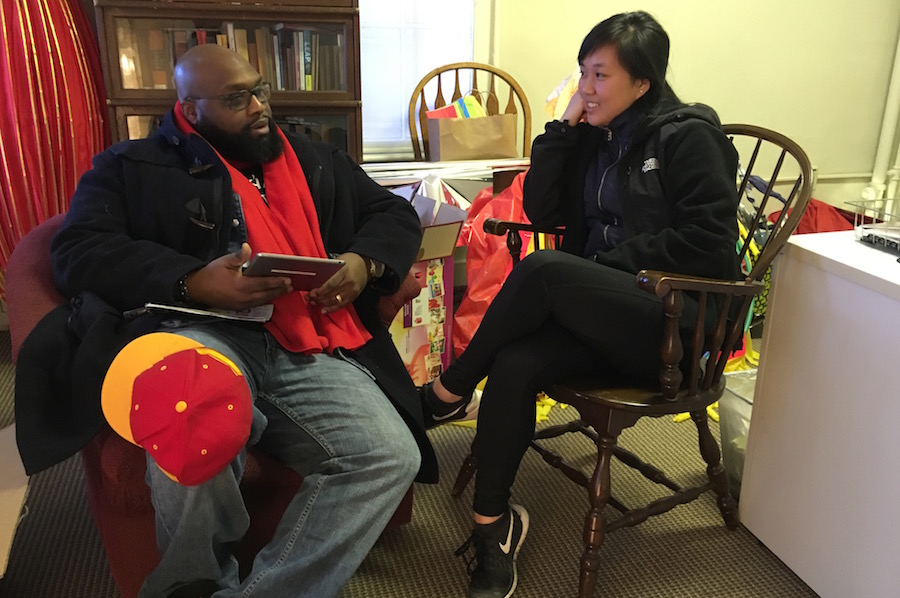
| Seth Poole: "I thought Chinese people were superheroes." |
At the Ely Center, Yale-China Arts Fellow Nicole Pun had taken a different spin on the day, thinking about how one specific aspect of Chinese culture has been digested—and sometimes commodified—in American hands. With a camera and bowl of special-order fortune cookies at the ready, Pun welcomed attendees into a second-floor room filled with pillows and blankets, inviting them to sit down. A bowl of plastic-wrapped fortune cookies sat next to her right foot.
“What are your experiences with fortune cookies?” she asked attendees one by one, turning the camera on to tape.
Throughout the day, she found it was a question people took a moment to think about. One woman had opened a cookie when she was eight months pregnant, seen the Mandarin characters for “girl” written on the fortune, and assumed that she would have a healthy baby girl (she later did). Another had gotten a fortune promising that her loving relationship would last. She’d kept it in her wallet for eight years, until she broke up with the boyfriend she’d been dating when she got it.
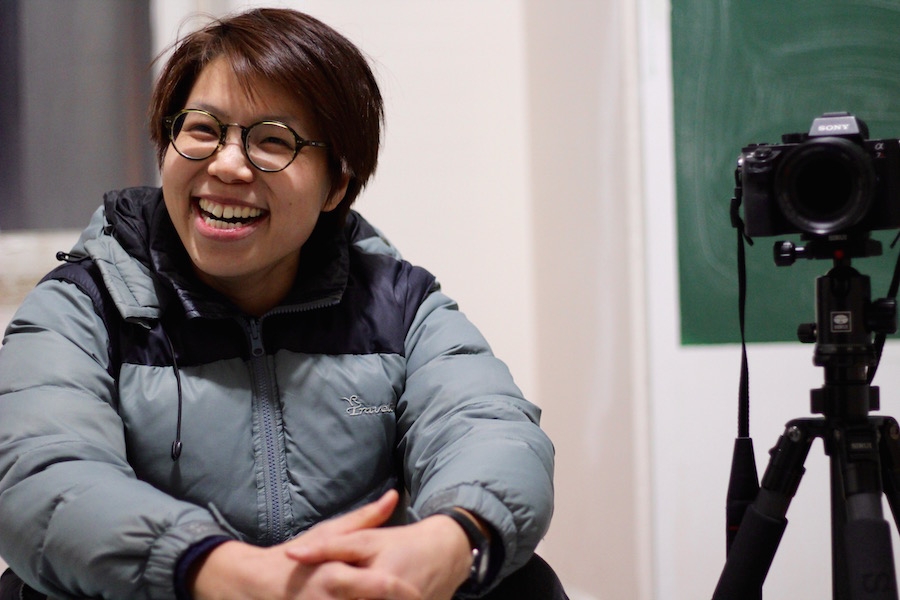
Pun presented attendees with a different cookie. Inside was Oscar Wilde’s quotation, “To love oneself is the beginning of a lifelong romance.” She kept the camera rolling as she asked for an interpretation.
“I’m always interested in fortune cookies,” she said after one such session. “The theme is so direct and intimate. You never know the source, but it’s on your hand, or in your wallet for years. Some people use them to buy their lottery tickets.”
A writer and artist from Hong Kong, Pun recalled the first time she saw a fortune cookie seven or eight years ago, while eating out in California during her first trip to the U.S. She was flummoxed, then captivated, by this uniquely American take on Chinese culture. The popup at the Ely Center is her first foray into talking about it.
“It is very orientalized,” she said. “But it’s also a very light way to think about it.”
To watch more from the event, click on the video below.

